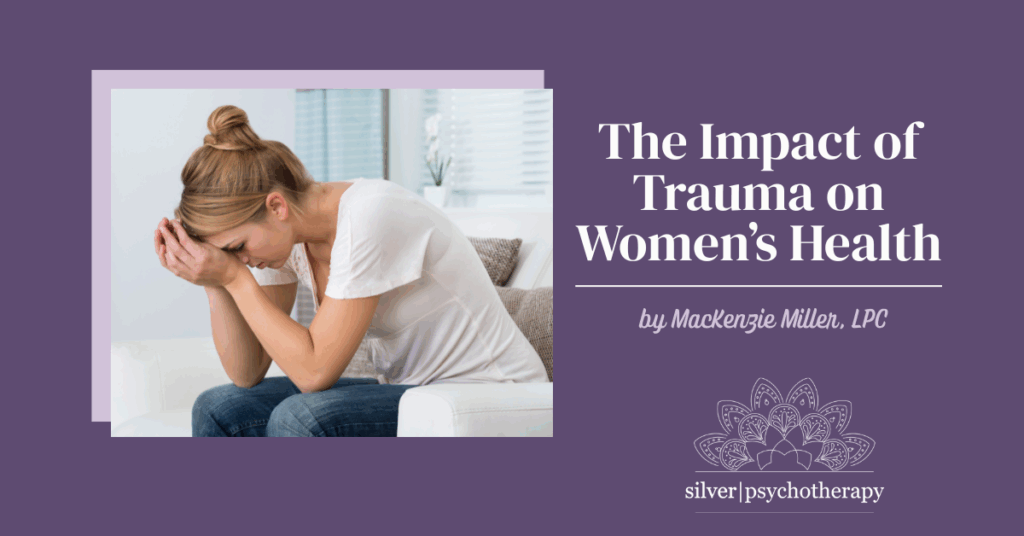Women and girls are an integral part of our society and their experiences and stories matter. The field of psychology has not always highlighted their importance throughout history but we are learning more about the unique ways women experience trauma and how it affects them throughout their lifespan.
The definition of trauma has changed over the years as we learn more about it. What was once defined as a rare event is becoming more conceptualized to reflect the inherently complex nature of trauma events and reactions that follow. Currently, the American Psychiatric Association (APA) and the Diagnostic and Statistical Manual of Mental Disorders (DSM-5) define trauma as exposure to actual or threatened death, serious injury, or sexual violence through directly experiencing the event, witnessing it occur to others, or learning that it occurred to a loved one. The concept of Posttraumatic Stress Disorder (PTSD) experienced by adults was not introduced until the 1980’s and more research on PTSD in children began to follow after. PTSD symptoms include experiencing intrusive flashbacks of the event, nightmares, dissociative symptoms, persistent emotional and cognitive distress among others. Even if an individual does not meet the full criteria for a formal PTSD diagnosis, they may still experience behavioral, physical, emotional, and cognitive changes that can impair daily life. It’s important for traumatic events to be considered within the context of an individual’s life and culture to truly understand how they may be affected.
Trauma has the potential to impact all aspects of an individual’s life in profound ways, including disrupting internal states of regulation, which in turn can impact physical and mental health. According to the National Center for PTSD, more than half of all women will experience at least one traumatic event during their lifetime. Women also tend to experience traumas earlier in life, which impacts neurobiological development and contributes to lifelong cognitive, emotional, and personality challenges. Men and women experience trauma in different ways due to biological, psychological, and sociocultural differences between genders.
Ongoing research has demonstrated is that the nature and frequency of trauma events can impact overall mental and physical health of the survivor. Trauma becomes complex when it is frequent, ongoing, interpersonal, and invasive in nature. The more complex that trauma becomes, the more complex and permeating the effects can be on the individual. Research also shows that women tend to experience sexual abuse at earlier ages. It is important to note the gaps in research representing men that survive sexual abuse in childhood. More can be learned about survivors of sexual violence that identify as men and factors that contribute to these gaps in research through websites such as the National Sexual Violence Resource Center.
Trauma can impact the way a person feels, thinks, and behaves. Research focusing on ways in which trauma impacts women’s mental health demonstrates an increased risk of developing eating disorders and substance use disorders after traumatic events. Research also shows that women experience PTSD at a higher rate, even double to triple the rate that men experience it. Women also experience increased lifetime prevalence of PTSD, at ten to twelve percent, compared to five to six percent for men. Women also experience PTSD symptoms for longer amounts of time before proper diagnosis and treatment. PTSD symptoms that women experience most often are an increased startle response, emotion and mood challenges including anxiety and depression, and avoidance of trauma reminders.
Trauma can also change how a person physically feels and responds to stressors long after the initial event(s). Physical health problems often develop as a result of PTSD. For example, fibromyalgia is strongly associated with a history of trauma. Gastrointestinal issues, such as irritable bowel syndrome (IBS), are also commonly diagnosed in women with trauma histories and symptoms are usually worsened by stress. Even if a woman does not meet clinical criteria for complex trauma and/or PTSD, it is common to experience disruptions in sleep and eating following traumatic experiences. Trauma can also influence fertility, pregnancy, and postpartum experiences for women. Trauma can impact reproductive health in other ways too, including the fact that childhood physical abuse and sexual abuse is associated with an increased risk of endometriosis in adulthood. Other conditions may include acid reflux, functional neurological disorders, migraines and chronic fatigue syndrome amongst others.
When considering trauma and its effects on women, it is necessary to take intersectionality into account. Each aspect of a person’s identity has implications for their experiences. For example, women face more barriers to PTSD diagnosis and treatment than men, but when we factor in a woman’s race, ethnicity, socioeconomic status, abilities, and age additional barriers to proper care can arise. Institutional racism and sexism and other causes of inequality in access and quality of healthcare can significantly influence a woman’s experiences with receiving support and/or treatment following traumatic events. Racism itself is finally being conceptualized as a form of trauma that contributes to psychological health disparities.
Supporting women’s health can come in many forms. Reducing shame and stigma around trauma by providing safe spaces to share and learn from each other can be profound for healing. Educating ourselves and others about the effects of trauma is also important. The books listed below are some examples of current literature that provide a wealth of information on trauma and health.
- What Happened to You? Conversations on Trauma, Resilience, and Healing by Oprah Winfrey and Bruce D. Perry M.D., Ph.D.
- My Grandmother’s Hands: Racialized Trauma and the Pathway to Mending Our Hearts and Bodies by Resmaa Menakem
- The Body Keeps the Score: Brain, Mind, and Body in the Healing of Trauma by Bessel van der Kolk M.D.
MacKenzie Miller, LPC is thoroughly trained in Trauma-Focused Cognitive Behavioral Therapy (TF-CBT) for children, teens, and families, as well as Eye Movement Desensitization and Reprocessing (EMDR) for all ages.

